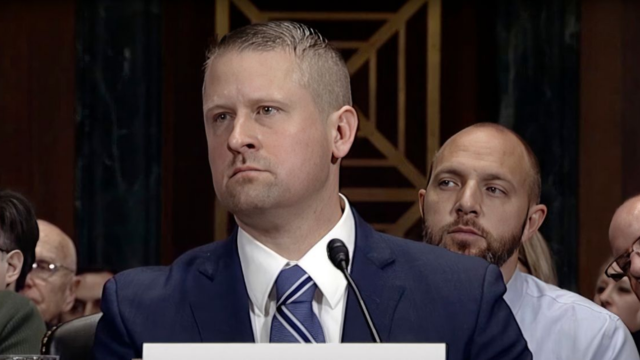A federal judge in Texas appointed by Donald Trump who is known for trying over and over to limit access to drugs used in abortions has said that transgender workers don’t need to be given special accommodations at work, even though that’s what the law says should happen.
The only judge in the Amarillo Division of the U.S. Northern District of Texas at the time, U.S. District Judge Matthew Kacsmaryk, agreed to the Lone Star State’s request for summary judgement against the Equal Employment Opportunity Commission (EEOC). He thought that the EEOC’s advice that transgender people should be able to use the bathroom that matches their gender identity and be able to use their own terms and names went beyond what the agency was legally allowed to do.
Two groups, the conservative Heritage Foundation and the state of Texas, filed the lawsuit in August 2024. Their own state departments have rules that say “employees are expected to comply with [the agency’s] dress code in a manner consistent with their biological gender.” Title VII of the federal Civil Rights Act is meant to protect workers from gender discrimination, and they said that the EEOC’s 2024 advice is wrong because of this and past Supreme Court decisions.
The judge laughed at the “myriad hypotheticals constituting harassment in violation of Title VII.” This shows that he doesn’t agree that not making accommodations for transgender workers is the same as the kind of sex-based harassment that is illegal under federal law. He partly thought that there couldn’t be discrimination if all transgender workers, transgender men and women alike, had to use facilities, clothes, names, and pronouns that were appropriate for their given sex.
Here, the longstanding implication of sex-specific bathrooms, locker rooms, and dress codes do not expose members of one sex “to disadvantageous terms or conditions of employment to which members of the other sex are not exposed.” Nor does using pronouns consistent with an employee’s biological sex. For example, if a male employee who identifies as female is required to use male facilities, he is not exposed to “disadvantageous terms” unlike other males. Instead, he must use male facilities like all other males. Nor is he exposed to “disadvantageous terms” female employees are not exposed to. All women must use female specific facilities. This logic also applies to both sex-specific dress codes and pronoun usage. All sexes are “exposed” to the same “terms and conditions”: using sex-specific facilities and employing with sex-specific dress codes and pronouns.
“Title VII does not allow discrimination based on biological’sex,’ it does not cover employment practices that only acknowledge and protect the ‘genuine’ differences between men and women,” Kacsmaryk said. “Not giving a transgender worker an exception to the otherwise gender-neutral rule about bathroom access, dress code, and pronoun usage does not amount to discriminatory “harassment” under Title VII.”
Kacsmaryk also thought that the EEOC guidance’s claims that it “does not have the force and effect of law” and “is not meant to bind the public in any way” were not true.
To counter these hypotheticals, the judge wrote, “The Enforcement Guidance stresses the ‘case by case’ nature of Title VII. However, the practical effect is clear: the Guidance is EEOC’s official statement of what it considers to be sex-based discrimination in violation of Title VII.” “It spells out the legal duties of employers and sets the standards from which legal consequences will follow.”
If employers don’t follow the advice, the judge said, they will almost certainly face “the headache of litigation.”
Per Kacsmaryk:
If refusing to use pronouns inconsistent with an employee’s biological sex constitutes discriminatory harassment in [a hypothetical example], why should an employer even risk a Title VII violation? The practical effect of the Enforcement Guidance is an unmistakable message to employers: it’s better to be safe than sorry. At best, refusing to accommodate transgender employees’ requests to dress, use a restroom, or be referred to by pronouns inconsistent with their biological sex is most likely — if not always — a Title VII violation. Like [previous guidance], the Enforcement Guidance here unquestionably “tells employers how to avoid” Title VII liability for employment discrimination.
Based on the Supreme Court’s important decision in the 2020 case of Bostock v. Clayton, the judge also said that the EEOC’s “metastasised definition of’sex'” was wrong. A majority of 6-3 of the justices found that federal law protects workers from being fired because of their sexual orientation or gender identity. But Kacsmaryk said that the ruling doesn’t mean that workplace changes have to be made; it just means that firings would be unfair.
“Bostock’s only decision was whether “firing someone simply because they are gay or transgender” violated Title VII’s ban on sex discrimination,” Kacsmaryk wrote.
He added:
But the Supreme Court was clear: its holding was narrow and expressly cabined to the question presented in Bostock. The Supreme Court acknowledged that the parties’ fears that ‘sex-segregated bathrooms, locker rooms, and dress codes will prove unsustainable’ after its decision. But it explicitly stated that ‘[u]nder Title VII … we do not purport to address bathrooms, locker rooms, or anything else of the kind. And ‘[w]hether other policies and practices might or might not qualify as unlawful discrimination or find justifications under other provisions of Title VII are questions for future cases, not these.’ Thus, the Supreme Court expressly refused to extend its reasoning in Bostock to the scenarios and hypotheticals contemplated in the Enforcement Guidance. And the EEOC cannot “fill in the blanks” for the Supreme Court.
Along with turning down the EEOC’s cross-motion for summary judgement, Kacsmaryk granted the plaintiffs’ request for summary judgement. He also said that the EEOC’s advice was “not in line with the law” and “vacated” the rules.
You can read Kacsmaryk’s whole decision here.





More Stories
Trump-Appointed Judge Blocks Transgender Workplace Protections, Citing ‘Metastasized Definition of Sex’
Trump-Appointed Judge Blocks Transgender Workplace Protections, Citing ‘Metastasized Definition of Sex’
Trump-Appointed Judge Blocks Transgender Workplace Protections, Citing ‘Metastasized Definition of Sex’